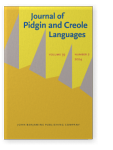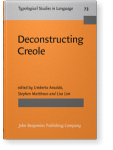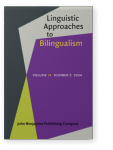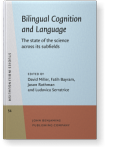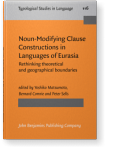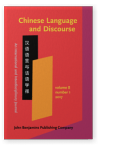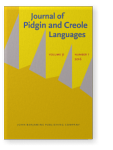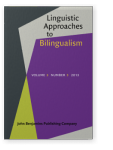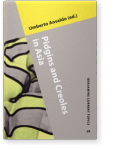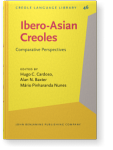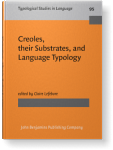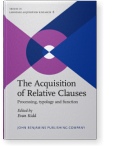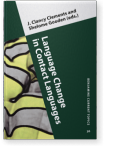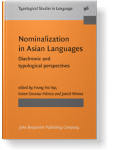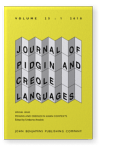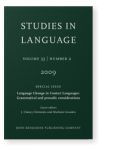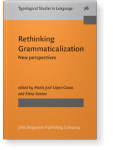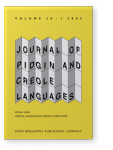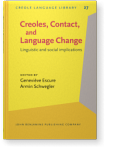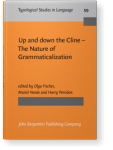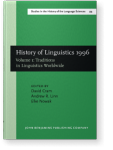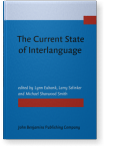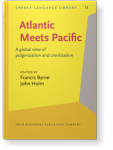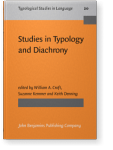Stephen Matthews
List of John Benjamins publications for which Stephen Matthews plays a role.
Journal
Title
Deconstructing Creole
Edited by Umberto Ansaldo, Stephen Matthews and Lisa Lim
[Typological Studies in Language, 73] 2007. xii, 292 pp.
Subjects Creole studies | Typology
2024 Prosodic interaction in Cantonese-English bilingual children’s speech production Linguistic Approaches to Bilingualism 14:5, pp. 668–707 | Article
This corpus-based study investigates intonation patterns in the production of Cantonese by Cantonese-English bilingual children. We examine the intonation patterns in eight simultaneous bilingual children acquiring a tonal (Cantonese) and an intonational language (English) from 2;0 to 3;0. Two… read more
2018 Chapter 9. CHILDES for bilingualism Bilingual Cognition and Language: The state of the science across its subfields, Miller, David, Fatih Bayram, Jason Rothman and Ludovica Serratrice (eds.), pp. 183–202 | Chapter
The CHILDES archive has revolutionized the study of bilingual development. We review the available corpora and their properties, some methods that have been used in creating and analyzing corpus data, and the kinds of analyses that it has made possible. These points are illustrated with corpus data… read more
2017 Noun-modifying clauses in Cantonese Noun-Modifying Clause Constructions in Languages of Eurasia: Rethinking theoretical and geographical boundaries, Matsumoto, Yoshiko, Bernard Comrie and Peter Sells (eds.), pp. 105–120 | Article
Whether relative clauses can be identified in Chinese is a recurrent question. We ask whether relative clauses are distinct from other noun-modifying clause constructions in Cantonese, one of many East Asian languages in which a noun can be preceded by a diverse range of modifying clauses. The… read more
2017 Relative clauses in English-Mandarin bilingual children: Language transfer and development in Singapore Chinese Language and Discourse 8:1, pp. 1–17 | Article
The role of cross-linguistic influence in bilingual children’s development remains a matter of debate. Some researchers have proposed that simultaneous bilingual learners develop the linguistic systems of two languages in the same way as matched monolingual children do. Other researchers have… read more
2016 An outline of Macau Pidgin Portuguese Journal of Pidgin and Creole Languages 31:1, pp. 141–183 | Article
In the early stages of the China trade European traders knew nothing of Chinese, while the Chinese traders were equally ignorant of European languages. It was in this setting that pidgin languages developed for interethnic communication. While the role of Chinese Pidgin English in the China trade… read more
2012 China Coast Pidgin: Texts and contexts Pidgins and Creoles in Asia, Ansaldo, Umberto (ed.), pp. 59–90 | Article
In this paper we revisit some long-standing questions regarding the origins and structure of China Coast Pidgin (CCP), also known as Chinese Pidgin English. We first review the historical context of the China Trade which formed the ecology for the development of CCP. We then review the available… read more
2012 Portuguese pidgin and Chinese Pidgin English in the Canton trade Ibero-Asian Creoles: Comparative Perspectives, Cardoso, Hugo C., Alan N. Baxter and Mário Pinharanda-Nunes (eds.), pp. 263–288 | Article
While the role of Chinese Pidgin English (CPE) in the Canton trade is relatively well-understood, the role of pidgin Portuguese has remained less clear. We review the evidence for the use of pidgin Portuguese and for its influence on the development of CPE. There is evidence of gradual replacement… read more
2011 The Cantonese substrate in China Coast Pidgin Creoles, their Substrates, and Language Typology, Lefebvre, Claire (ed.), pp. 289–301 | Article
The “Chinese” character of Chinese Pidgin English, or China Coast Pidgin (CCP) has been debated in previous work. While some Chinese-based features such as the use of piece(e) as a classifier are widely acknowledged, the extent of substrate influence has remained unclear. This paper surveys the… read more
2011 Chapter 8. The acquisition of relative clauses in Cantonese and Mandarin The Acquisition of Relative Clauses: Processing, typology and function, Kidd, Evan (ed.), pp. 197–226 | Article
We discuss three typological characteristics relevant to the acquisition of relative clauses (RCs) in Cantonese and Mandarin: (i) the prenominal position of RCs; (ii) the availability of an internally-headed analysis for Cantonese object RCs; and (iii) Chinese RCs as a subset of noun modifying… read more
2011 Contact-induced grammaticalization: Evidence from bilingual acquisition Language Change in Contact Languages: Grammatical and prosodic considerations, Clements, J. Clancy and Shelome Gooden (eds.), pp. 107–135 | Article
It is widely acknowledged that developments in bilingual individuals parallel, and ultimately underlie, those taking place in the course of contact-induced change. In this paper we address the poorly understood relationship between the individual and community-level processes, focusing on the… read more
2011 On the polyfunctionality and grammaticalization of the morpheme kai in the Chaozhou dialect Nominalization in Asian Languages: Diachronic and typological perspectives, Yap, Foong Ha, Karen Grunow-Hårsta and Janick Wrona (eds.), pp. 109–124 | Article
The morpheme kai is among the most frequent and polyfunctional in Chaozhou, a Min dialect of Chinese. The present paper aims to present a descriptive and analytical account of the various functions of kai from Chaozhou in order to shed more light on nominalization and the diachronic development of… read more
2010 China Coast Pidgin: Texts and contexts Pidgins and Creoles in Asian Contexts, Ansaldo, Umberto (ed.), pp. 63–94 | Article
In this paper we revisit some long-standing questions regarding the origins and structure of China Coast Pidgin (CCP), also known as Chinese Pidgin English. We first review the historical context of the China Trade which formed the ecology for the development of CCP. We then review the available… read more
2009 Contact-induced grammaticalization: Evidence from bilingual acquisition Language Change in Contact Languages: Grammatical and prosodic considerations, Clements, J. Clancy and Shelome Gooden (eds.), pp. 366–395 | Article
It is widely acknowledged that developments in bilingual individuals parallel, and ultimately underlie, those taking place in the course of contact-induced change. In this paper we address the poorly understood relationship between the individual and community-level processes, focusing on the… read more
2008 The development of nominalizers in East Asian and Tibeto-Burman languages Rethinking Grammaticalization: New perspectives, López-Couso, María José and Elena Seoane (eds.), pp. 309–341 | Article
This paper presents evidence of recurring patterns as well as of language-specific variations in the development of nominalizers across several East Asian and Tibeto-Burman languages. Special attention is pa to the different grammaticalization pathways of nominalizer morphemes and to the links… read more
2007 Deconstructing creole: The rationale Deconstructing Creole, Ansaldo, Umberto, Stephen Matthews and Lisa Lim (eds.), pp. 1–18 | Article
2005 Review of Smith (2002): Growing up with Tok Pisin: Contact, creolization and change in Papua New Guinea’s national language Creole Language in Creole Literatures, Mühleisen, Susanne (ed.), pp. 208–211 | Review
2004 1. The origins of Macanese reduplication Creoles, Contact, and Language Change: Linguistic and social implications, Escure, Geneviève and Armin Schwegler (eds.), pp. 1–19 | Chapter
2004 From pronominalizer to pragmatic marker: Implications for unidirectionality from a crosslinguistic perspective Up and down the Cline – The Nature of Grammaticalization, Fischer, Olga, Muriel Norde and Harry Perridon (eds.), pp. 137–168 | Article
1999 Y.R. Chao and Universal Chinese Grammar History of Linguistics 1996: Volume 1: Traditions in Linguistics Worldwide, Cram, David, Andrew R. Linn and Elke Nowak (eds.), pp. 217–226 | Chapter
1995 I-interlanguage and typology: The case of topic-prominence The Current State of Interlanguage: Studies in honor of William E. Rutherford, Eubank, Lynn, Larry Selinker and Michael Sharwood Smith (eds.), pp. 17–30 | Article
1993 Creole Aspect and Morphological Typology Atlantic Meets Pacific: A global view of pidginization and creolization, Byrne, Francis and John Holm † (eds.), pp. 233–242 | Article
1990 Prolegomena to a typology of Tough Movement Studies in Typology and Diachrony: Papers presented to Joseph H. Greenberg on his 75th birthday, Croft, William A., Suzanne Kemmer and Keith Denning (eds.), pp. 43–58 | Article
